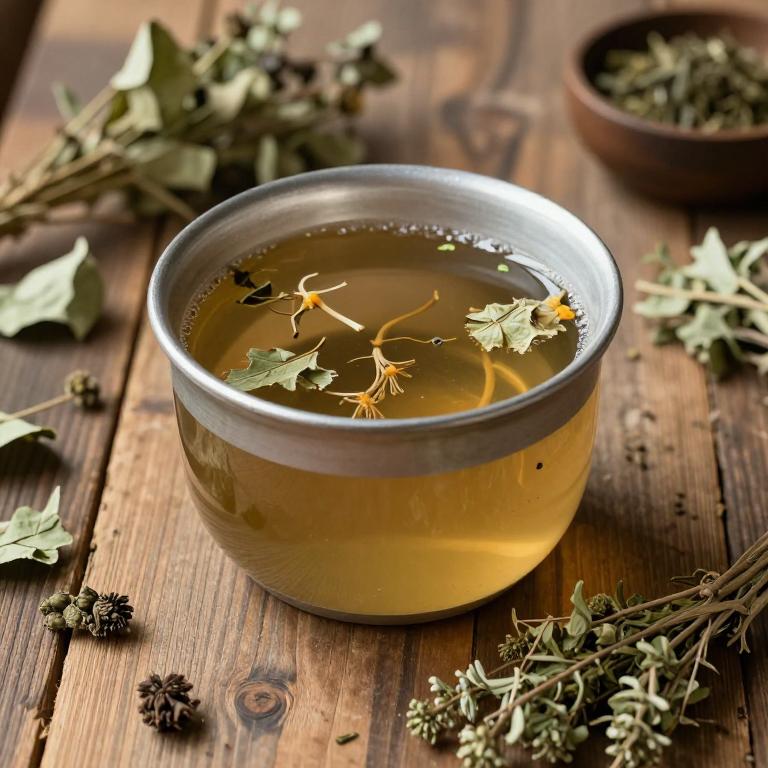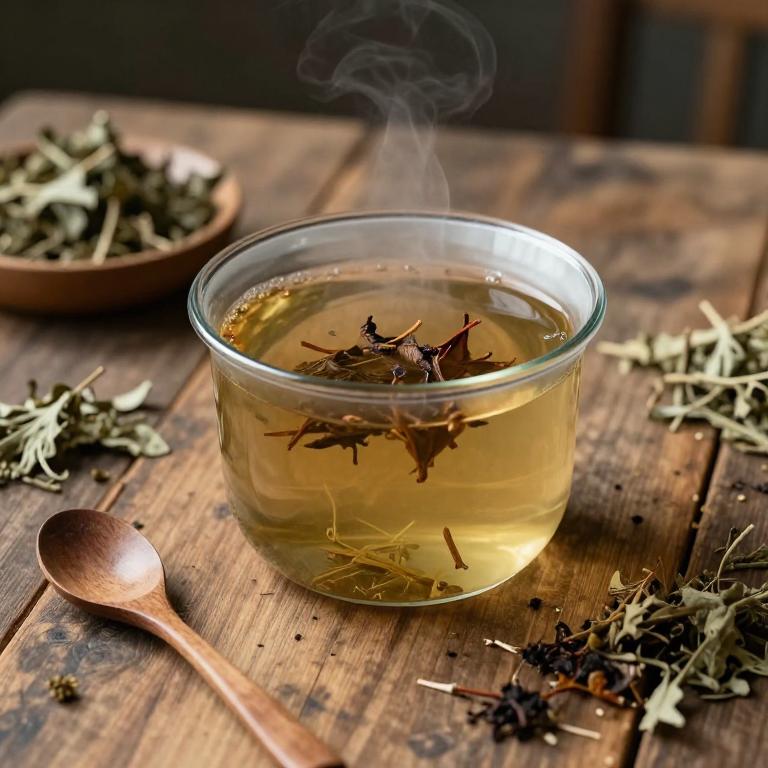10 Best Herbal Decoctions For Dry Skin

Herbal decoctions can be an effective natural remedy for dry skin, as they often contain soothing and moisturizing ingredients like chamomile, calendula, and oatstraw.
These herbs are typically simmered in water to extract their beneficial compounds, creating a nourishing bath or topical application. The anti-inflammatory and emollient properties of these decoctions help to hydrate and calm irritated skin. Using a herbal decoction as a bath or compress can provide long-lasting relief and improve skin texture.
However, it is important to consult a healthcare professional before using herbal treatments, especially for those with sensitive or severely dry skin.
Table of Contents
- 1. Aloe vera (Aloe barbadensis)
- 2. Stinging nettle (Urtica dioica)
- 3. English lavender (Lavandula angustifolia)
- 4. Field horsetail (Equisetum arvense)
- 5. St. john's wort (Hypericum perforatum)
- 6. European plum (Prunus domestica)
- 7. Rosemary (Rosmarinus officinalis)
- 8. Marigold (Calendula officinalis)
- 9. Thistle (Silybum marianum)
- 10. German chamomile (Chamomilla recutita)
1. Aloe vera (Aloe barbadensis)

Aloe barbadensis, commonly known as aloe vera, is widely used in herbal decoctions for its soothing and hydrating properties, making it particularly beneficial for dry skin.
When prepared as a decoction, the gel from the aloe plant is gently heated to extract its active compounds, such as vitamins, minerals, and antioxidants, which help to nourish and restore the skin's moisture barrier. This herbal remedy is known for its anti-inflammatory effects, which can reduce redness and irritation associated with dryness. The natural polysaccharides in aloe vera also promote skin cell regeneration, aiding in the healing of cracked or flaky skin.
Overall, aloe barbadensis decoctions offer a natural and effective way to alleviate dry skin conditions and enhance skin health.
2. Stinging nettle (Urtica dioica)

Urtica dioica, commonly known as stinging nettle, is often used in herbal decoctions to address dry skin due to its high content of minerals and antioxidants.
When prepared as a decoction, the leaves and stems of the plant are simmered in water to extract their beneficial compounds, which can help soothe and nourish the skin. This herbal remedy is believed to improve skin hydration by promoting the production of collagen and enhancing the skin's natural moisture barrier. The anti-inflammatory properties of stinging nettle may also reduce redness and irritation associated with dry skin conditions.
However, it is important to consult a healthcare professional before using stinging nettle decoctions, especially for those with sensitive skin or existing health conditions.
3. English lavender (Lavandula angustifolia)

Lavandula angustifolia, commonly known as English lavender, has been widely used in herbal medicine for its soothing and therapeutic properties.
Herbal decoctions made from lavender are particularly beneficial for dry skin due to their high concentration of essential oils and anti-inflammatory compounds. The process of making a lavender decoction involves simmering the dried plant material in water to extract its beneficial compounds, creating a nourishing and calming solution. When applied topically, lavender decoctions can help to moisturize, reduce inflammation, and promote skin healing.
These natural remedies offer a gentle and effective alternative for those seeking to alleviate dryness and irritation without harsh chemicals.
4. Field horsetail (Equisetum arvense)

Equisetum arvense, commonly known as horsetail, is often used in herbal decoctions to address dry skin due to its high concentration of silica, which promotes skin elasticity and strength.
When prepared as a decoction by simmering the dried herb in water for an extended period, it can help to soothe and moisturize dry, flaky skin. The astringent properties of horsetail may also help to reduce inflammation and tighten the skin's surface. However, it is important to use it cautiously, as excessive consumption can lead to mineral imbalances.
This herbal remedy is typically used in conjunction with other moisturizing agents for best results in treating dry skin conditions.
5. St. john's wort (Hypericum perforatum)

Hypericum perforatum, commonly known as St. John's Wort, is traditionally used in herbal medicine for its potential skin-soothing properties.
When prepared as a decoction, the plant's leaves and flowers are simmered in water to extract their active compounds, including hypericin and flavonoids, which may have anti-inflammatory and antioxidant effects. This herbal decoction is often applied topically to dry skin to help alleviate irritation and promote healing. The warming and nourishing properties of the decoction can help restore moisture and improve skin texture.
However, it is important to consult a healthcare provider before use, as it may interact with certain medications.
6. European plum (Prunus domestica)

Prunus domestica, commonly known as the European plum, has been traditionally used in herbal medicine for its potential benefits for dry skin.
Herbal decoctions made from the dried fruit or bark of Prunus domestica are believed to possess moisturizing and anti-inflammatory properties that can help soothe and hydrate dry, irritated skin. These decoctions are often prepared by simmering the plant material in water for an extended period to extract its active compounds, such as vitamins, minerals, and antioxidants. The resulting infusion can be applied topically as a compress or used in bath infusions to provide gentle hydration and relief.
While more research is needed, preliminary studies suggest that Prunus domestica may offer a natural alternative for managing dry skin conditions when used as part of a holistic skincare routine.
7. Rosemary (Rosmarinus officinalis)

Rosmarinus officinalis, commonly known as rosemary, is a versatile herbal plant often used in decoctions to address various skin concerns, including dryness.
When prepared as a herbal decoction, rosemary leaves are simmered in water to extract their essential oils and nutrients, creating a nourishing and aromatic remedy. The decoction is rich in antioxidants, anti-inflammatory compounds, and essential fatty acids, which help to hydrate and soothe dry, flaky skin. Applying rosemary decoction topically can improve skin elasticity and reduce the appearance of rough texture.
However, it is advisable to perform a patch test before use, as some individuals may experience skin sensitivity to its strong aromatic properties.
8. Marigold (Calendula officinalis)

Calendula officinalis, commonly known as the pot marigold, is a popular herbal remedy used to soothe and nourish dry skin due to its anti-inflammatory and antioxidant properties.
When prepared as a decoction, calendula can be applied topically to help reduce redness, irritation, and flakiness associated with dryness. The preparation involves simmering the dried flowers in water for several minutes to extract their beneficial compounds, such as flavonoids and triterpenoids. This herbal decoction is particularly effective for conditions like eczema and dermatitis, offering a natural alternative to commercial skincare products.
Regular use of calendula decoctions may promote skin hydration and enhance the skin's natural barrier function, making it a valuable addition to a skincare routine for those with sensitive or dry skin.
9. Thistle (Silybum marianum)

Silybum marianum, commonly known as milk thistle, is a herbal remedy that has been traditionally used for its potential skin benefits.
Herbal decoctions made from the seeds of Silybum marianum are believed to support skin health due to their high content of bioactive compounds, including silymarin. These decoctions may help in reducing inflammation and promoting skin regeneration, which can be beneficial for individuals with dry skin. The anti-oxidant properties of silymarin may also help protect the skin from environmental stressors.
However, it is important to consult with a healthcare professional before using milk thistle decoctions, as they may interact with certain medications or have side effects in some individuals.
10. German chamomile (Chamomilla recutita)

Chamomilla recutita, commonly known as German chamomile, is a popular herb used in herbal decoctions to address dry skin due to its anti-inflammatory and soothing properties.
When prepared as a decoction, chamomile releases compounds such as bisabolol and chamazulene, which help to reduce redness, irritation, and inflammation associated with dryness. This herbal remedy is often applied topically in the form of a warm compress or infused oil to provide deep hydration and relief. Its mild, calming scent also offers a pleasant sensory experience during treatment.
While generally safe for most skin types, it is advisable to perform a patch test before regular use to ensure no allergic reaction occurs.